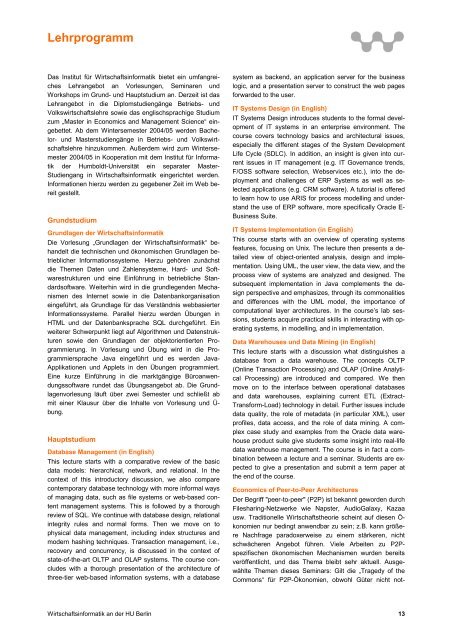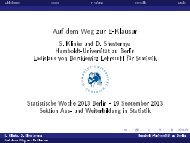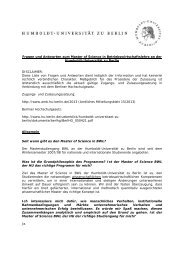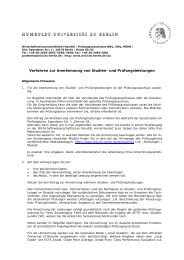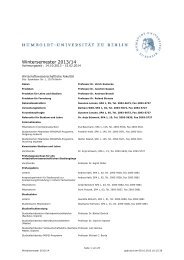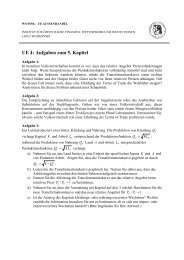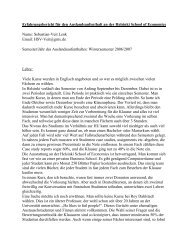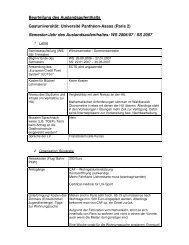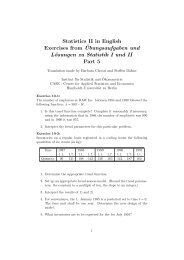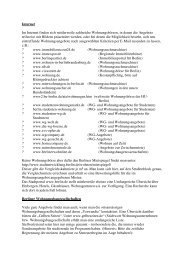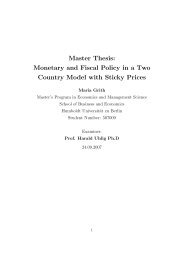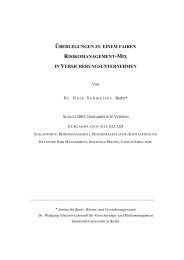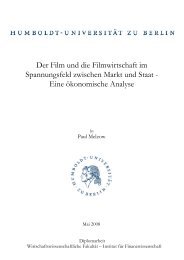Berlin-Brandenburger Graduiertenkolleg
Berlin-Brandenburger Graduiertenkolleg
Berlin-Brandenburger Graduiertenkolleg
Sie wollen auch ein ePaper? Erhöhen Sie die Reichweite Ihrer Titel.
YUMPU macht aus Druck-PDFs automatisch weboptimierte ePaper, die Google liebt.
Lehrprogramm<br />
Das Institut für Wirtschaftsinformatik bietet ein umfangreiches<br />
Lehrangebot an Vorlesungen, Seminaren und<br />
Workshops im Grund- und Hauptstudium an. Derzeit ist das<br />
Lehrangebot in die Diplomstudiengänge Betriebs- und<br />
Volkswirtschaftslehre sowie das englischsprachige Studium<br />
zum „Master in Economics and Management Science“ eingebettet.<br />
Ab dem Wintersemester 2004/05 werden Bachelor-<br />
und Masterstudiengänge in Betriebs- und Volkswirtschaftslehre<br />
hinzukommen. Außerdem wird zum Wintersemester<br />
2004/05 in Kooperation mit dem Institut für Informatik<br />
der Humboldt-Universität ein separater Master-<br />
Studiengang in Wirtschaftsinformatik eingerichtet werden.<br />
Informationen hierzu werden zu gegebener Zeit im Web bereit<br />
gestellt.<br />
Grundstudium<br />
Grundlagen der Wirtschaftsinformatik<br />
Die Vorlesung „Grundlagen der Wirtschaftsinformatik“ behandelt<br />
die technischen und ökonomischen Grundlagen betrieblicher<br />
Informationssysteme. Hierzu gehören zunächst<br />
die Themen Daten und Zahlensysteme, Hard- und Softwarestrukturen<br />
und eine Einführung in betriebliche Standardsoftware.<br />
Weiterhin wird in die grundlegenden Mechanismen<br />
des Internet sowie in die Datenbankorganisation<br />
eingeführt, als Grundlage für das Verständnis webbasierter<br />
Informationssysteme. Parallel hierzu werden Übungen in<br />
HTML und der Datenbanksprache SQL durchgeführt. Ein<br />
weiterer Schwerpunkt liegt auf Algorithmen und Datenstrukturen<br />
sowie den Grundlagen der objektorientierten Programmierung.<br />
In Vorlesung und Übung wird in die Programmiersprache<br />
Java eingeführt und es werden Java-<br />
Applikationen und Applets in den Übungen programmiert.<br />
Eine kurze Einführung in die marktgängige Büroanwendungssoftware<br />
rundet das Übungsangebot ab. Die Grundlagenvorlesung<br />
läuft über zwei Semester und schließt ab<br />
mit einer Klausur über die Inhalte von Vorlesung und Übung.<br />
Hauptstudium<br />
Database Management (in English)<br />
This lecture starts with a comparative review of the basic<br />
data models: hierarchical, network, and relational. In the<br />
context of this introductory discussion, we also compare<br />
contemporary database technology with more informal ways<br />
of managing data, such as file systems or web-based content<br />
management systems. This is followed by a thorough<br />
review of SQL. We continue with database design, relational<br />
integrity rules and normal forms. Then we move on to<br />
physical data management, including index structures and<br />
modern hashing techniques. Transaction management, i.e.,<br />
recovery and concurrency, is discussed in the context of<br />
state-of-the-art OLTP and OLAP systems. The course concludes<br />
with a thorough presentation of the architecture of<br />
three-tier web-based information systems, with a database<br />
system as backend, an application server for the business<br />
logic, and a presentation server to construct the web pages<br />
forwarded to the user.<br />
IT Systems Design (in English)<br />
IT Systems Design introduces students to the formal development<br />
of IT systems in an enterprise environment. The<br />
course covers technology basics and architectural issues,<br />
especially the different stages of the System Development<br />
Life Cycle (SDLC). In addition, an insight is given into current<br />
issues in IT management (e.g. IT Governance trends,<br />
F/OSS software selection, Webservices etc.), into the deployment<br />
and challenges of ERP Systems as well as selected<br />
applications (e.g. CRM software). A tutorial is offered<br />
to learn how to use ARIS for process modelling and understand<br />
the use of ERP software, more specifically Oracle E-<br />
Business Suite.<br />
IT Systems Implementation (in English)<br />
This course starts with an overview of operating systems<br />
features, focusing on Unix. The lecture then presents a detailed<br />
view of object-oriented analysis, design and implementation.<br />
Using UML, the user view, the data view, and the<br />
process view of systems are analyzed and designed. The<br />
subsequent implementation in Java complements the design<br />
perspective and emphasizes, through its commonalities<br />
and differences with the UML model, the importance of<br />
computational layer architectures. In the course’s lab sessions,<br />
students acquire practical skills in interacting with operating<br />
systems, in modelling, and in implementation.<br />
Data Warehouses und Data Mining (in English)<br />
This lecture starts with a discussion what distinguishes a<br />
database from a data warehouse. The concepts OLTP<br />
(Online Transaction Processing) and OLAP (Online Analytical<br />
Processing) are introduced and compared. We then<br />
move on to the interface between operational databases<br />
and data warehouses, explaining current ETL (Extract-<br />
Transform-Load) technology in detail. Further issues include<br />
data quality, the role of metadata (in particular XML), user<br />
profiles, data access, and the role of data mining. A complex<br />
case study and examples from the Oracle data warehouse<br />
product suite give students some insight into real-life<br />
data warehouse management. The course is in fact a combination<br />
between a lecture and a seminar. Students are expected<br />
to give a presentation and submit a term paper at<br />
the end of the course.<br />
Economics of Peer-to-Peer Architectures<br />
Der Begriff "peer-to-peer" (P2P) ist bekannt geworden durch<br />
Filesharing-Netzwerke wie Napster, AudioGalaxy, Kazaa<br />
usw. Traditionelle Wirtschaftstheorie scheint auf diesen Ökonomien<br />
nur bedingt anwendbar zu sein; z.B. kann größere<br />
Nachfrage paradoxerweise zu einem stärkeren, nicht<br />
schwächeren Angebot führen. Viele Arbeiten zu P2Pspezifischen<br />
ökonomischen Mechanismen wurden bereits<br />
veröffentlicht, und das Thema bleibt sehr aktuell. Ausgewählte<br />
Themen dieses Seminars: Gilt die „Tragedy of the<br />
Commons“ für P2P-Ökonomien, obwohl Güter nicht not-<br />
Wirtschaftsinformatik an der HU <strong>Berlin</strong> 13


